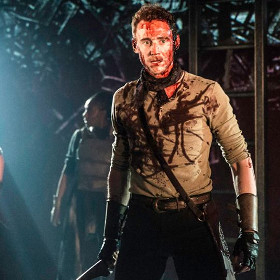Coriolanus (Donmar Warehouse)
Tom Hiddleston impresses in Shakespeare’s great Roman tragedy at the Donmar Warehouse

Tom Hiddleston, lately a baddie and an action man in the movies, and voted the world’s sexiest film star, certainly puts himself through it as Coriolanus: he clambers up a high, steep ladder, strips to the waist, douses himself in blood, showers off, gets pelted with rotten tomatoes by the populace, fights like a dervish and dies upside down, hanging by his feet like Mussolini.
And yet the extraordinary thing about his performance in Josie Rourke‘s slick and sold-out production – which you can see broadcast live (courtesy of the National Theatre) across the UK on 30 January – is its unflinching, cold demeanour.
The martial hero is bounced – against his will – into political power, loses favour, turns on the Roman electorate (“You common cry of curs”), seeks out his mortal enemy, Aufidius (a gruff and bearded Hadley Fraser), leader of the Volscians, returns to lay waste his home town, softens to the pleas of his mother (Deborah Findlay) and is denounced a traitor by the away team.
It’s a simple, spartan story, decked out with some of Shakespeare’s most vivid, brilliant and sinewy verse, and Hiddleston rides it like an Olympic horseman. Coriolanus is a far more complicated, conflicted character than Henry V – whom Hiddleston played with a memorable disdain on television last year – and the approach here is to allow the twists and turns to form around him, defining his character by the effect he has on people.
So, Hiddleston’s sombre blankness is coloured in by the words and opinions of others, ranging from the wonderfully pitched soft reasonableness of Mark Gatiss‘ Menenius, with his great speech about the body politic, to the sour musings of the tribunes played with a fine sarcasm by Elliot Levey and Helen Schlesinger.
And then there are the “soldiers’ wives” of Findlay’s tigerish Volumnia, the hero’s seemingly estranged wife, Virgilia, played by Birgitte Hjort Sǿrensen (from Borgen on television) in a metallic see-through “dolce vita” cocktail dress, and her friend Valeria, notably well-spoken in the ensemble by Jacqueline Boatswain.
Rourke and designer Lucy Osborne create a high back wall of graffiti, cinematically lit by Mark Henderson (the live transmission very much on everyone’s minds), the small stage area marked out by a line of chairs that is mobilised throughout.
 It’s a staging at once stark and expressive (the showers of red petals are the only lapse into cliché), surprisingly renewing the idea of a historical tragedy as a chamber piece; it is likely that the first performance in 1608 was given in the intimate Blackfriars Theatre.
It’s a staging at once stark and expressive (the showers of red petals are the only lapse into cliché), surprisingly renewing the idea of a historical tragedy as a chamber piece; it is likely that the first performance in 1608 was given in the intimate Blackfriars Theatre.
The single ladder is replicated in projections for the siege of Corioli, and the battle conveyed in a flashing fireworks display. The intensity of the play is shared among the whole cast, not least Peter De Jersey’s fiery Cominius and Alfred Enoch’s deeply involved and concerned Titus Lartius.
The first image is that of Young Martius (Joe Willis on opening night) drawing a circle of blood, presaging the game he later joins with a toy sword. There’s nothing jokey, though, about the first citizen’s (Rochenda Sandall) angry tirade.
And what follows suggests that Hiddleston’s Coriolanus sees himself as a supple, super-confident games player, rather than a professional, proactive man-of-war (in the style of Ian McKellen, say, or Toby Stephens). It’s an original, and disturbing, interpretation, almost an alternative commentary on the brilliant Ralph Fiennes movie.












